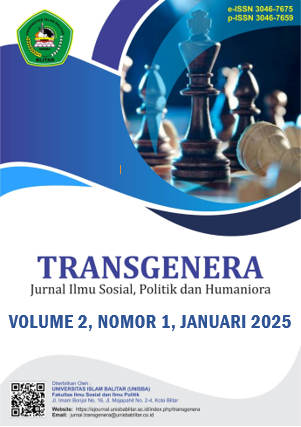Feminisme dan Politik: Mengurai Hambatan dan Peluang Bagi Pemimpin Perempuan
DOI:
https://doi.org/10.35457/transgenera.v2i1.4091Keywords:
Feminism, Politics, WomenAbstract
The goal of the social, political, and intellectual movement known as feminism is to eliminate gender-based inequalities. Participation that forms gender stereotypes about women's issues and politics in general includes women's political rights. Research Methods This article To investigate the potential and challenges faced by women political leaders from a feminist perspective, this study uses qualitative techniques with a case study design. stereotype is when a person or group of people are given certain characteristics based on subjective classifications simply because they belong to a particular group (in-group or out-group), which can be positive or negative. The dual role of women in Indonesian politics is complicated, they often have to balance their responsibilities as housewives with their political roles as activists or leaders. The theoretical analysis that has been given states that the theory of violation of expectations describes a situation where an individual has expectations or hopes for the nonverbal behavior of others. Stereotypes are perceptions or beliefs about groups or people that are based on pre-existing opinions and attitudes.
Downloads
References
Aziz, Y. M. (2016). Dinamika Sistem Politik Indonesia. Bandung: CV pustaka setia.
Budiman, K. (2020). Gender dan Politik di Indonesia. Jakarta: Gramedia.
Fakih, M. (2012). Analisis Gender dan Transformasi Sosial. Yogyakarta: Insist Press.
Fauziah, R. (2019). Feminisme dan Politik: Menyuarakan Pemimpin Perempuan dalam Dunia Politik. Jakarta: Penerbit Buku Kompas.
Rinaldi, H. (2021). Feminisme, Politik, dan Kuota Gender: Kajian Kritis tentang Peran Perempuan di Parlemen. Surabaya: Penerbit Universitas Airlangga.
Sari, M. D. (2020). Kepemimpinan Perempuan dalam Dunia Politik: Peluang dan Hambatan. Bandung: Pustaka Belajar.
Suryakusuma, J. (2011). State Ibuism: Ideologi Gender di Indonesia. Jakarta: Komunitas Bambu.
Downloads
Published
Issue
Section
License
Authors who publish with this journal agree to the following terms:
- Copyright on any article is retained by the author(s).
- Author grant the journal, right of first publication with the work simultaneously licensed under a Creative Commons Attribution License that allows others to share the work with an acknowledgement of the work’s authorship and initial publication in this journal.
- Authors are able to enter into separate, additional contractual arrangements for the non-exclusive distribution of the journal’s published version of the work (e.g., post it to an institutional repository or publish it in a book), with an acknowledgement of its initial publication in this journal.
- Authors are permitted and encouraged to post their work online (e.g., in institutional repositories or on their website) prior to and during the submission process, as it can lead to productive exchanges, as well as earlier and greater citation of published work.
- The article and any associated published material is distributed under the Creative Commons Attribution-ShareAlike 4.0 International License.













